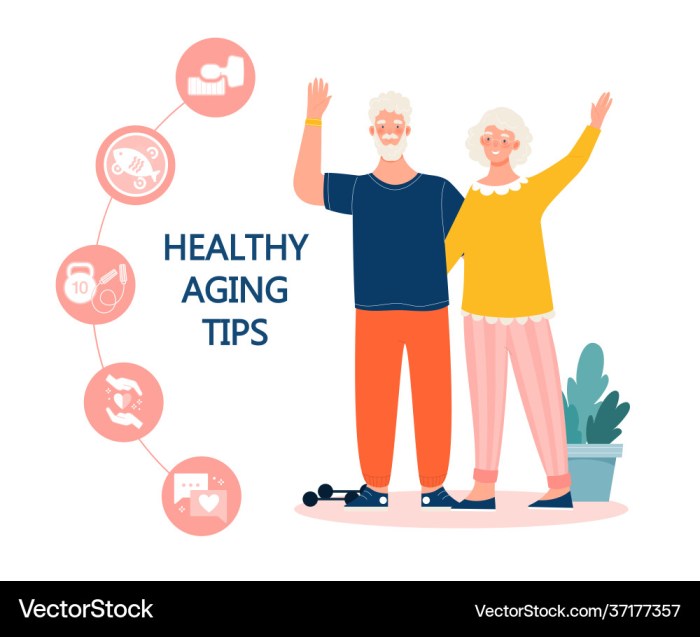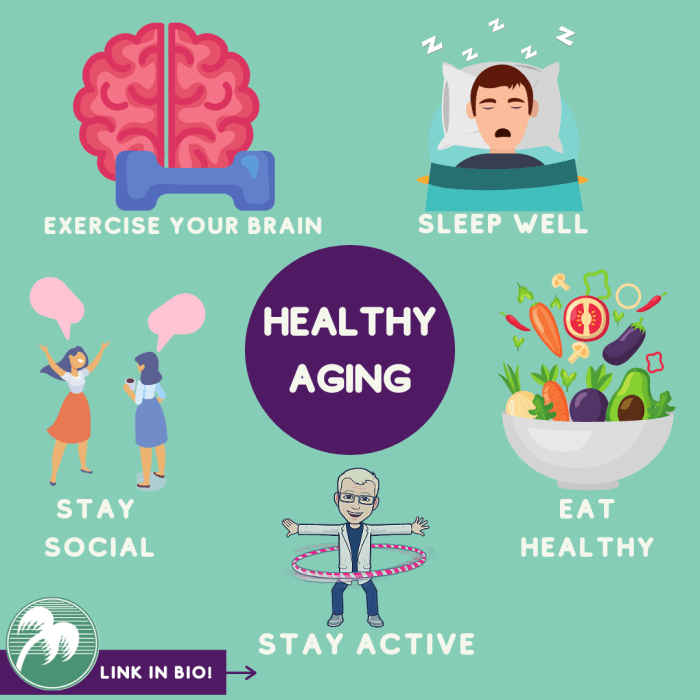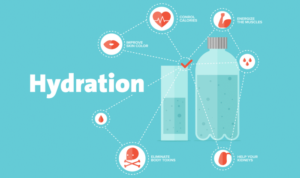With healthy aging at the forefront, this paragraph opens a window to an amazing start and intrigue, inviting readers to embark on a storytelling journey filled with unexpected twists and insights. From exploring the significance of maintaining health to diving into the factors that influence aging, this topic is a blend of wisdom and vitality that resonates with all of us on the journey of life.
As we navigate the complexities of nutrition, physical activity, and mental health in the context of aging gracefully, one thing becomes clear – the path to healthy aging is as diverse as it is rewarding. Join us in unraveling the secrets to a fulfilling and vibrant life at every stage of the journey.
Importance of Healthy Aging

As we age, it becomes increasingly important to focus on maintaining our health in order to live a fulfilling and active life. Healthy aging is crucial for various reasons, impacting our overall well-being and quality of life.
Benefits of Healthy Aging
- Improved physical health: Engaging in regular exercise and maintaining a balanced diet can help prevent chronic diseases and boost overall physical well-being.
- Enhanced mental health: Staying mentally active through activities like reading, puzzles, or social interactions can reduce the risk of cognitive decline and improve mood.
- Stronger social connections: Maintaining relationships with friends and family can provide emotional support and reduce feelings of loneliness, contributing to better mental health.
- Increased independence: By taking care of our health, we can prolong our ability to perform daily tasks independently and maintain a sense of autonomy.
How Healthy Aging Improves Quality of Life
- Greater longevity: Healthy aging practices can extend our lifespan and allow us to enjoy more years of active and fulfilling experiences.
- Enhanced mobility: By focusing on fitness and nutrition, we can preserve our physical capabilities and continue to engage in activities we love.
- Reduced healthcare costs: Preventing chronic conditions through healthy aging can lead to lower medical expenses and a higher quality of life in the long run.
Factors Influencing Healthy Aging
Healthy aging is influenced by a variety of factors that can either promote or hinder the aging process. Understanding these key factors is essential in maintaining a high quality of life as we grow older.
1. Lifestyle Choices
Lifestyle choices play a significant role in healthy aging. Engaging in regular physical activity, maintaining a balanced diet rich in nutrients, staying socially connected, and managing stress effectively can all contribute to overall well-being and longevity.
2. Genetics
Genetics also play a crucial role in the aging process. While we cannot change our genetic makeup, understanding our family history and potential genetic predispositions can help us make informed decisions about our health and wellness as we age.
Nutrition and Healthy Aging
Proper nutrition plays a crucial role in promoting healthy aging by providing essential nutrients to support overall well-being and combat age-related health issues.
Importance of Nutrition in Healthy Aging
Nutrition directly impacts various aspects of aging, such as cognitive function, bone health, immune system strength, and energy levels. A balanced diet rich in vitamins, minerals, antioxidants, and healthy fats can help seniors maintain vitality and reduce the risk of chronic diseases.
- Eat a variety of colorful fruits and vegetables to ensure a wide range of vitamins and antioxidants.
- Incorporate lean protein sources like poultry, fish, beans, and nuts to support muscle mass and function.
- Choose whole grains over refined grains for fiber, energy, and sustained blood sugar levels.
- Include sources of healthy fats such as avocados, olive oil, and fatty fish to support heart health and brain function.
- Stay hydrated by drinking an adequate amount of water throughout the day to support digestion, circulation, and overall health.
Nutrient-Rich Foods for Seniors, Healthy aging
Seniors should focus on consuming nutrient-dense foods to meet their specific health needs. Some examples include:
- Dark leafy greens like spinach and kale for vitamin K, calcium, and antioxidants.
- Berries such as blueberries and strawberries for their high levels of antioxidants and fiber.
- Fatty fish like salmon and mackerel for omega-3 fatty acids that support heart and brain health.
- Yogurt and other dairy products for calcium, vitamin D, and probiotics to maintain bone health and gut function.
- Nuts and seeds for healthy fats, protein, and essential minerals like magnesium and zinc.
Impact of Dietary Choices on the Aging Process
Unhealthy dietary choices can accelerate the aging process and increase the risk of age-related diseases. Consuming excessive amounts of processed foods, sugary beverages, and unhealthy fats can lead to inflammation, oxidative stress, and a weakened immune system. On the other hand, a diet rich in whole, nutrient-dense foods can help seniors stay active, maintain cognitive function, and enjoy a higher quality of life as they age.
Physical Activity and Healthy Aging
Regular exercise is crucial for healthy aging as it helps maintain physical strength, flexibility, and overall well-being. It also reduces the risk of chronic diseases such as heart disease, diabetes, and osteoporosis.
Benefits of Regular Exercise for Healthy Aging
- Improves cardiovascular health and reduces the risk of heart disease
- Enhances muscle strength and flexibility, reducing the risk of falls and injuries
- Helps maintain a healthy weight and metabolism
- Boosts mood and mental well-being, reducing the risk of depression and anxiety
Types of Exercises Suitable for Older Adults
- Walking or brisk walking
- Swimming or water aerobics
- Yoga or Tai Chi for balance and flexibility
- Strength training with light weights or resistance bands
How Physical Activity Can Enhance Longevity and Well-being
Regular physical activity can increase longevity by reducing the risk of chronic diseases and maintaining overall health. It also improves quality of life by promoting independence, mobility, and mental well-being in older adults.
Mental Health and Healthy Aging

Maintaining good mental health is crucial for healthy aging. As we get older, our cognitive function and overall mental well-being play a significant role in our quality of life. It is essential to focus on strategies that promote mental wellness to ensure a fulfilling and vibrant aging process.
Strategies for Maintaining Cognitive Function
- Engage in regular mental exercises such as puzzles, reading, or learning new skills to keep your brain active and sharp.
- Stay socially connected by interacting with friends, family, and community members to prevent feelings of isolation and loneliness.
- Get an adequate amount of sleep each night to support cognitive function and memory retention.
- Follow a healthy diet rich in antioxidants, omega-3 fatty acids, and vitamins to nourish your brain and support cognitive health.
- Practice stress-reducing techniques like meditation, yoga, or deep breathing exercises to promote mental relaxation and clarity.
Importance of Social Connections
Social connections play a vital role in promoting healthy aging by providing emotional support, companionship, and a sense of belonging. Maintaining strong relationships with others can help reduce stress, boost mood, and improve overall mental well-being.


